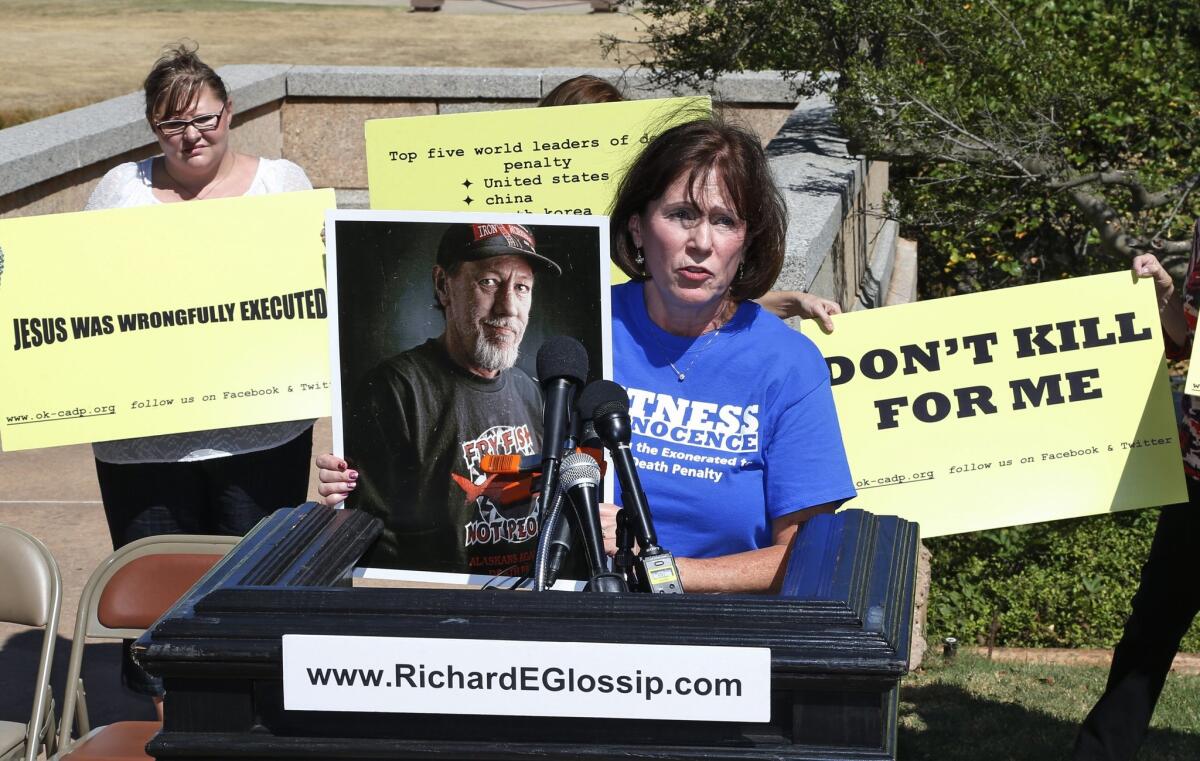Court delays execution of Oklahoma man who claims innocence in 1997 killing

Nancy Vollertsen holds a photo of her brother, Greg Wilhoit, who spent five years on Oklahoma’s death row before being exonerated. She was protesting the scheduled execution of Richard Glossip.
- Share via
Just three hours before Richard Glossip was set to be put to death by lethal injection Wednesday, an Oklahoma appeals court temporarily halted his execution, giving him a two-week reprieve in one of the nation’s highest-profile death penalty cases.
Oklahoma’s scheduled 3 p.m. execution of Glossip, 52, for murder would have been its first since the U.S. Supreme Court narrowly approved the state’s controversial lethal-injection procedures in June.
Several celebrities and Oklahoma public figures have urged the state not to execute Glossip, who has sworn he is innocent in the 1997 killing of Barry Van Treese, his boss at the hotel where he worked in Oklahoma City.
Prosecutors said Glossip arranged to have Van Treese killed by a hotel janitor, Justin Sneed, who took a plea deal and received a life sentence in exchange for testifying against Glossip.
The case against Glossip largely rested on Sneed’s word, leading several high-profile figures — including former Sen. Tom Coburn and former University of Oklahoma football coach Barry Switzer — to call on the state to delay or cancel Glossip’s execution out of concern for his possible innocence.
Celebrities including Susan Sarandon, George Takei and anti-death-penalty advocate Sister Helen Prejean have also spoken out against Oklahoma’s attempts to execute Glossip.
Oklahoma Gov. Mary Fallin had brushed those requests aside, saying in a statement Tuesday, “After carefully reviewing the facts of this case multiple times, I see no reason to cast doubt on the guilty verdict reached by the jury or to delay Glossip’s sentence of death.”
Glossip’s attorneys had filed a desperate appeal Tuesday to Oklahoma’s Court of Criminal Appeals, arguing that Glossip did not get a fair trial and had ineffective help from his trial attorneys.
“Newly discovered evidence reveals that Sneed’s testimony was much weaker than even this court has acknowledged,” the attorneys wrote in the appeal. They included an affidavit from one of Sneed’s former cellmates who claimed Sneed said he had “set Richard Glossip up.”
“We know Mr. Glossip did not kill anyone,” Glossip’s attorneys wrote. “The only evidence that he was even involved in a killing comes from Justin Sneed’s lips.”
In a two-page response Wednesday, the appeals court granted a two-week stay so it could “give fair consideration” to the appeal. Another execution date was set for Sept. 30.
“It’s great!” Prejean, a nun and the author of “Dead Man Walking” — a 1994 memoir of her visits to death row inmates in Louisiana — told reporters standing outside the Oklahoma State Penitentiary in McAlester. “One day he’s going to walk outside of those gates.”
Oklahoma Atty. Gen. Scott Pruitt, however, said he was confident that the court would not find a reason to overturn Glossip’s conviction.
“The family of Barry Van Treese has waited 18 agonizing years for justice to be realized for his brutal death,” Pruitt said in a statement after Glossip’s stay of execution.
Glossip’s name is permanently stamped into the American legal record after his challenge of Oklahoma’s use of the lethal-injection drug midazolam — a case titled Glossip vs. Gross — reached the Supreme Court.
Oklahoma in particular had faced criticism over its lethal-injection procedures after its chaotic 2014 execution of Clayton Lockett, who took almost an hour to die after receiving a mixture of drugs that included the sedative midazolam.
The Supreme Court decided 5 to 4 that Oklahoma and other death penalty states could use the drug, but the case was notable for its dissent by two liberal justices who signaled that they would be open to an outright challenge against the death penalty itself.
Follow @MattDPearce for national news
ALSO:
California’s death penalty hangs in the balance
Connecticut Supreme Court, citing death penalty’s failings, broadens state’s ban
Oklahoma death row inmates sue over ‘unsound’ execution practices
More to Read
Sign up for Essential California
The most important California stories and recommendations in your inbox every morning.
You may occasionally receive promotional content from the Los Angeles Times.











